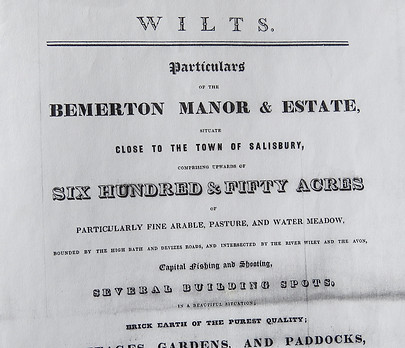Bemerton HISTORY
preserving the past for the future
End of the Manor
By the 18th century, the Manor of Bemerton had descended through the Grobham family to John Howe, who became the 4th Baron Chedworth. He rarely visited his estate in Wiltshire and lived in seclusion in Suffolk, indulging himself in his passion for Shakespeare.
He died in 1804, unmarried and without children, when the baronetcy became extinct. Chedworth left his estate to his close theatrical friends and advisors, which was considered outrageous by his relatives. By far the largest share of his wealth was left to his legal adviser, Richard Wilson. Chadworth’s family contested the will on the grounds of his insanity but their claim was unsuccessful.
Richard Wilson, Esq, a solicitor of Lincoln’s Inn Fields in London, therefore inherited half of Lord Chedworth’s estates in Wiltshire and Gloucestershire and a sum of £40,000, which made him an extremely wealthy man.
Wilson was a political opportunist from Northumberland, known as ‘Morpeth Dick’, and quickly assimilated himself among the great and good at Westminster. He won the Ipswich by-election but held the seat for only a year before he lost it in the following general election.
As far as we know, there is no record of Wilson having involved himself in his Wiltshire inheritance. But when the estate was put up for auction, a ‘Mr Wilson’ – perhaps a relative acting as one of the executors of his estate – lived in the Manor House, which then was on land opposite today’s Bemerton Farm retirement complex.
Wilson also inherited the Gloucestershire estate of his brother, who was a surgeon; he sold off that land to buy Bildeston Manor in Suffolk as his country retreat, gave up his legal practice in London and retired to set up a racing stud.
After Richard Wilson died in 1834 Bemerton was put up for sale by auction in lots of varying sizes, according to his wishes.

The great auction took place in The White Heart Hotel in Salisbury on the 8th and 9th of May 1838. The auction of the “Bemerton Manor & Estate” comprised “650 acres of particularly fine arable, pasture, and water meadow with capital fishing and shooting.” Among the 70 lots for sale were “several building spots, in a beautiful situation, brick earth of the purest quality, cottages, gardens and paddocks forming nearly the whole village of Bemerton.”
The estate stretched from Quidhampton to Churchfields and most of the agricultural land - on the western side, including part of Quidhampton - was purchased by the Earl of Pembroke to add to his Wilton estate; Bemerton, on the other hand, was offered up for sale in small lots.
At the time of the sale some of the existing village buildings were already present. The sale afforded an opportunity for the hamlet to develop into a popular and convenient village close to Salisbury and, later, to access a new form of transport - the railways.
As development spread in the 20th century to the north of the Wilton Road, Bemerton effectively became a suburb of Salisbury. The decision was taken in the 1950s by the local authority to refer to the new developments to the north of Wilton Road as Bemerton Heath and - without consultation, it seems - to rebrand the ancient hamlet of Bemerton. Village residents woke one morning to find a new signpost at the top of Church Lane, pointing to ‘Lower Bemerton’.